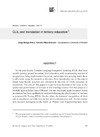Please use this identifier to cite or link to this item:
https://accedacris.ulpgc.es/jspui/handle/10553/12251
| DC Field | Value | Language |
|---|---|---|
| dc.contributor.author | Braga Riera, Jorge | en_US |
| dc.contributor.author | Maíz Arévalo, Carmen | en_US |
| dc.date.accessioned | 2014-10-01T02:30:40Z | - |
| dc.date.accessioned | 2018-03-15T14:28:07Z | - |
| dc.date.available | 2014-10-01T02:30:40Z | - |
| dc.date.available | 2018-03-15T14:28:07Z | - |
| dc.date.issued | 2013 | en_US |
| dc.identifier.issn | 1133-1127 | en_US |
| dc.identifier.uri | https://accedacris.ulpgc.es/handle/10553/12251 | - |
| dc.description.abstract | In the past decade, Content Language Integrated Learning (CLIL) has been steadily gaining ground in tertiary-level education, with an increasing number of programmes being implemented. However, and despite this growing trend, there is still a wide scope for research in this area. More specifically, one of the aspects which have hardly received any attention is the role of CLIL lecturers as translators. The aim of this paper is to prove how translation has a say in the quality and performance of lectures in this teaching context. For that purpose, a twofold approach has been followed. On the one hand, eight lecturers’ actual production has been qualitatively analysed following the phasal analysis of lectures as proposed by Young (1994). On the other, the lecturers’ recognition of their role as translators in CLIL lessons has been considered as well. To this double aim, lectures belonging to the fields of Physics and Engineering have been recorded, transcribed and analysed, with special attention being paid to phasal division. As for our next goal, the answers to a 26-item questionnaire addressed to lecturers and containing reflections on their translating activity have also been thoroughly studied. Findings show that translation does indeed play a pivotal role in the linguistic quality of lectures, with those phases in which translation applies resulting in lower levels of L1 interference. Further research on this area may indeed determine how valuable translation skills are in order to develop a higher efficiency in the preparation and delivery of university lectures. | en_US |
| dc.format | es | |
| dc.language | eng | en_US |
| dc.relation.ispartof | LFE. Revista de Lenguas para Fines Específicos | en_US |
| dc.source | LFE. Revista de lenguas para fines específicos [ISSN 1133-1127], n. 19, p. 29-59 | en_US |
| dc.subject | 570107 Lengua y literatura | en_US |
| dc.subject | 550510 Filología | en_US |
| dc.subject.other | CLIL | en_US |
| dc.subject.other | Translation | en_US |
| dc.subject.other | Tertiary education | en_US |
| dc.subject.other | L1 interference | en_US |
| dc.subject.other | Lecture | en_US |
| dc.title | CLIL and translation in tertiary education | en_US |
| dc.type | info:eu-repo/semantics/article | en_US |
| dc.type | Article | en_US |
| dc.compliance.driver | 1 | es |
| dc.identifier.absysnet | 233536 | - |
| dc.description.lastpage | 59 | en_US |
| dc.description.firstpage | 29 | en_US |
| dc.investigacion | Artes y Humanidades | en_US |
| dc.rights.accessrights | info:eu-repo/semantics/openAccess | es |
| dc.type2 | Artículo | en_US |
| dc.utils.revision | Sí | en_US |
| dc.identifier.ulpgc | Sí | en_US |
| dc.description.esci | ESCI | |
| dc.description.dialnetimpact | 0,0 | |
| dc.description.dialnetq | Q2 | |
| dc.description.erihplus | ERIH PLUS | |
| item.grantfulltext | open | - |
| item.fulltext | Con texto completo | - |
| Appears in Collections: | LFE, Rev. leng. fines específ. n.19, 2013 Artículos | |
Page view(s)
116
checked on Dec 14, 2024
Download(s)
108
checked on Dec 14, 2024
Google ScholarTM
Check
Share
Export metadata
Items in accedaCRIS are protected by copyright, with all rights reserved, unless otherwise indicated.
